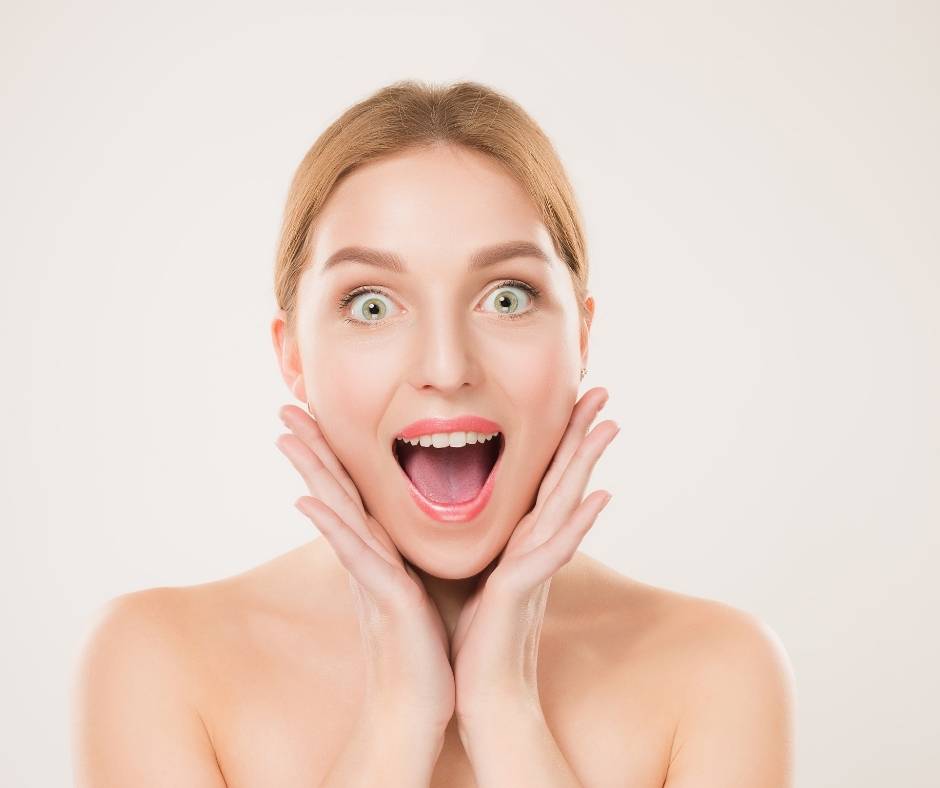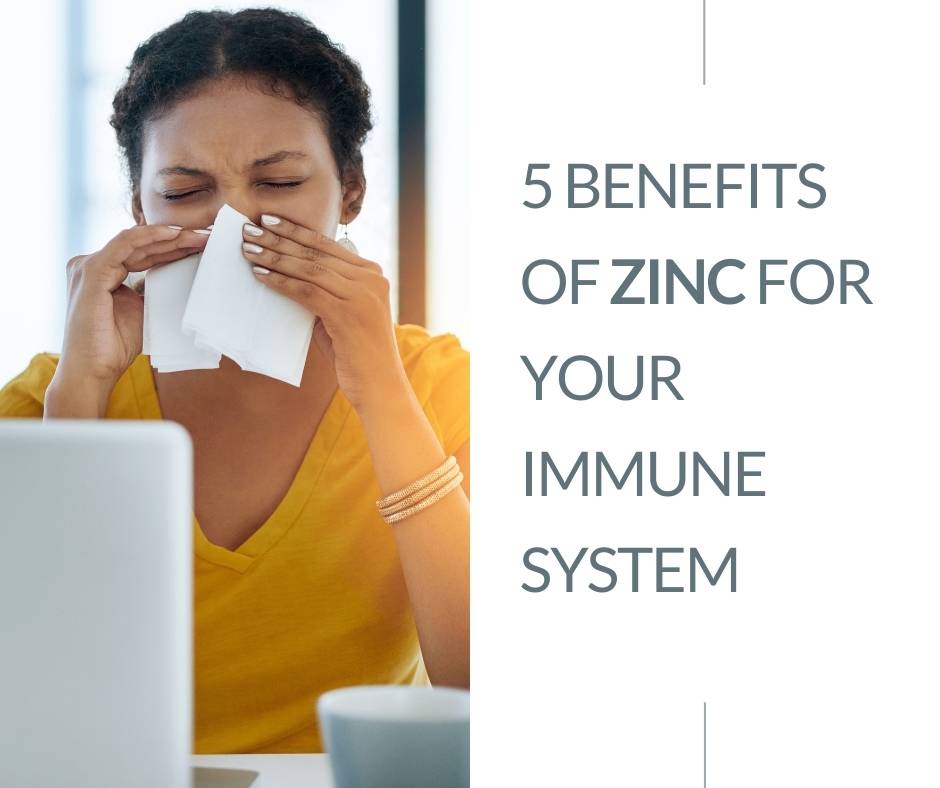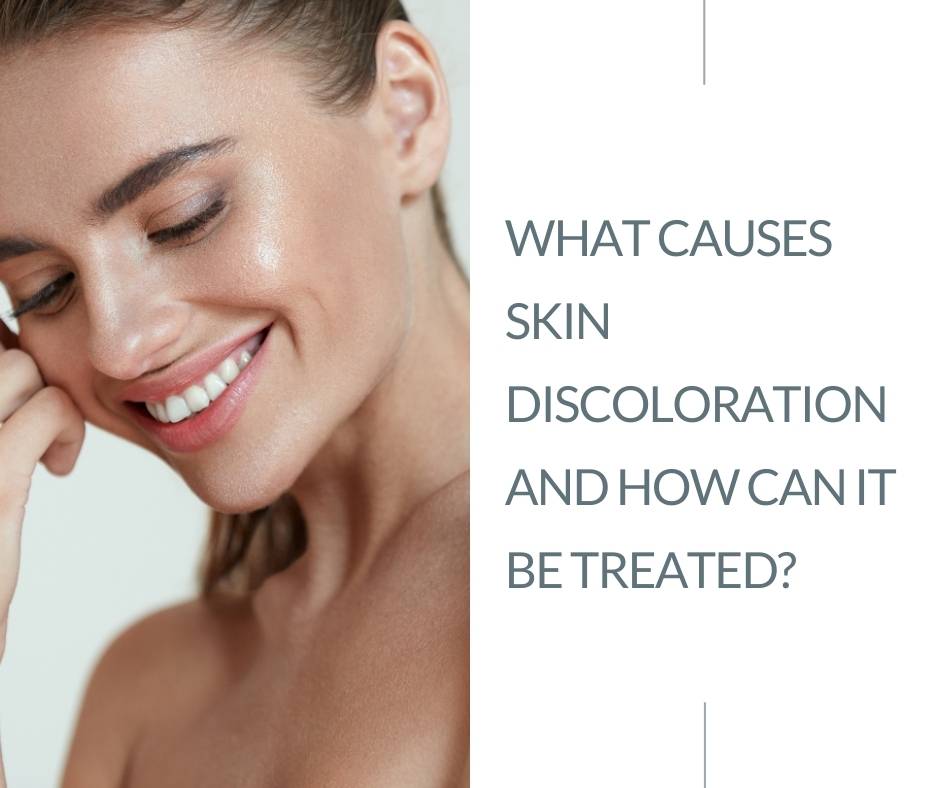What causes skin discolouration and how can it be treated?Skin discoloration is a common issue, and it can manifest in different ways. Maybe you notice more freckles on your face than usual. Perhaps you find age spots forming on your arm. Or you might see dark patches on the skin across your face, arms, or legs. And you’ll probably feel concerned when you spot any changes in your skin, even if it’s only cosmetic. But what actually causes skin discoloration? And what treatments can you try to reduce its visibility? What causes pigmentation problems?Pigmentation (also known as hyperpigmentation) refers to uneven skin coloring in one or more areas. For example, a dark patch will stand out against the lighter skin around it, especially on the face (where it’s not so easy to cover up). This might affect the way in which you see yourself, and cause you to avoid mixing with others or taking part in activities you usually enjoy. But pigmentation issues may be easier to address once you identify the cause. So, let’s explore the causes of common skin discoloration types: Age spotsAge spots (or sunspots) are flat, brown spots that form in different areas of the body. They’re typically painless and harmless. They may even be called liver spots, though the liver has no connection to them. What causes age spots? The simple answer is that they’re triggered by exposure to the sun or by using tanning beds. But the more complex answer is that age spots form when melanin becomes clustered in the skin, or is produced in higher concentrations than before. Melanin is the substance within the body that provides your skin with its color. And when ultraviolet rays penetrate the skin, they prompt melanocytes to produce melanin and protect the skin from sun damage. The more time you spend in direct sunlight, the more melanin your body will produce, and you’ll develop a tan — or age spots. These tend to appear on parts of the body most commonly exposed to UV rays, including the face, arms, decolletage, hands, and neck. Obviously, if you spend a lot of time working on a full body tan, it’s possible that you could develop age spots in less visible places too. FrecklesSome people consider freckles to be one of their key defining features and take pride in showing them off to the world, just like the A-list stars covered in this People post. But for others, freckles can be a difficult aspect of their appearance to embrace. These tiny brown or beige spots tend to form in clusters, usually on the face, legs, and arms. They tend to become darker after you spend long periods in the sun, and may appear lighter throughout the winter. That’s because UV light will produce extra melanin and increase the visibility of your freckles. But genetics plays a part in freckle formation too. A gene known as MC1R determines the type of melanin the body produces: pheomelanin or eumelanin. The latter protects the skin from UV radiation, but the former doesn’t. If you have dark hair, dark eyes, and dark skin, it’s likely that you’ll produce eumelanin. And that means you’ll be less prone to freckles. But anyone with light hair (blonde, brown, red), skin, and eyes will primarily produce pheomelanin. This makes freckles much more likely. MelasmaMelasma creates dark patches on skin, usually brown or gray. These can form on the nose, forehead, cheeks, or chin. Even the upper lip may be affected. When melasma develops, it’s usually symmetrical on both sides of the face. But melasma can still show on other areas of the body besides the face: the forearms, neck, and anywhere else frequently exposed to sunlight. This condition can be caused by both UV exposure and hormonal changes. This sets it apart from hyperpigmentation, and can make it harder to treat. Pregnant women may be affected by melasma due to hormonal fluctuations, though certain medications (e.g. oral contraceptives) and treatments can contribute too. Melasma typically worsens during summer, particularly if you spend more time outdoors in bright weather without covering up or wearing sunblock. What skin discoloration treatments are available?If you’re looking to treat discoloration of the skin, multiple amazing treatments are available. Here are three of the most effective options to consider: The Perfect Derma PeelThe Perfect Derma Peel offers medical-grade formulations, containing numerous powerful ingredients:
The Perfect Derma Peel is designed to solve common skin issues, including age spots and dull complexions. They cater to all skin types and ethnicities. Results may be visible after just one week. Platelet-rich plasma (PRP) therapyPRP therapy involves taking a concentration of platelets from your blood, preparing them in a centrifuge, and injecting them back into your body. Why? The plasma releases growth factors that stimulate and increase the number of cells performing skin repairs. As a result, PRP therapy can cultivate healthier, tighter, more youthful skin. It’s known to reduce the visibility of dark circles, scars, and stretch marks. MesotherapyMesotherapy (often confused with microneedling) is designed to improve the skin’s overall appearance and leave it looking rejuvenated. It uses fine needles to make a series of injections into the skin’s middle layer. Various solutions may be injected, depending on the patient’s condition. While mesotherapy is a popular treatment for hyperpigmentation and age spots, it can also help with acne and common signs of aging. Glutathione IV therapyGlutathione IV therapy is increasingly popular for discoloration of the skin. This is an antioxidant occurring naturally in the body, known to inhibit melanin production. Glutathione IV therapy offers a number of benefits, including achieving a more even skin tone and reducing the visibility of hyperpigmentation issues (freckles, age spots, dark patches). Feel inspired to try a hyperpigmentation treatment? Each of these cutting-edge options is available at Astra Medicare today!. If you want to book a consultation for any of them or our other services, contact our expert team now!
0 Comments
5 benefits of Zinc for your immune systemA healthy immune system helps to defend the body against illness and infections. And you need to keep it in the best shape to maximize its protective power. How? You can try to get a good night’s sleep. Exercise on a regular basis. Eat healthy foods, including a varied mix of fruit, vegetables, and proteins. But there’s another key ingredient in the recipe for a strong immune system: zinc. Why is it so important? Here are five good reasons … Zinc can aid in the production of immune cellsZinc stimulates the growth of T helper cells. These are white blood cells with a crucial job: they target unwanted organisms entering the body — and fight them. Another type of immune cell is the macrophage. These are responsible for consuming and digesting anything that isn’t recognized as a healthy host cell, including:
This process (phagocytosis) helps you ward off viruses and diseases. And zinc can help them to complete the phagocytosis process and defend your system from bacteria. Anyone with a zinc deficiency may develop an impaired immune system, due to the reduction in macrophage function. The number of T helper cells would likely drop too. Zinc can reduce the risk of pneumoniaPneumonia is a dangerous disease affecting the lungs, capable of causing serious illness — and even death. From 2018 - 19, around 67,000 Canadians were hospitalized due to the condition, accounting for more than 2 percent of all inpatient hospitalizations at the time. But how could zinc help your immune system fend off pneumonia successfully? One of the microbes the immune system should target is Streptococcus pneumoniae — a form of bacteria responsible for causing pneumonia. Zinc can barricade the route this bacteria uses to consume nutrients. This denies the bacteria the sustenance it needs to persist, and starves them. A healthy immune system will then take over, unleashing immune cells to finish the pneumonia off. It’s not a miracle cure, sadly, but some patients may be safer from pneumonia if they elevate their zinc levels into a more normal range. Zinc can shorten the duration of common cold symptomsThe common cold is, well, common — adults have two or three colds each year on average, but children tend to have even more. We all recognize the signs: sore throat, coughing, runny nose, aches here and there. In some cases, a cold will become more serious and cause complications, such as ear infections. And while there’s still no cure, a strong immune system can help to reduce the amount of time that you actually spend suffering from the effects of a cold. Research shows that people who increase their zinc levels to a higher but safe level within 24 hours of noticing their first symptoms were far less likely to have symptoms one week later. Why? It’s simple: zinc may help to stop the virus replicating and spreading. Being able to reduce the duration of your cold could decrease the amount of time that you need to take away from work or other responsibilities. Zinc can fight inflammationUpping your zinc to a normal, healthier level could strengthen your body’s ability to combat problematic inflammation. Not all inflammation is negative: short-term inflammation actually helps to defend the body. But chronic inflammation can cause lasting pain and conditions, including:
But studies reveal that zinc can decrease inflammation, particularly in older people, as well as oxidative stress (a cause of inflammation). Those with a zinc deficiency are at higher risk of developing arthritis, and zinc was found to reduce infection rates by more than 65 percent. Zinc can maintain membrane barrier structureAnd last but not least? Let’s talk about membrane barrier structure. Zinc can help to maintain membrane structure and restore it, particularly in areas that may be vulnerable (e.g. the intestine and lungs). As a result, zinc can contribute to your body’s defensive capabilities. It can also stabilize cell membranes and help your skin heal: a zinc deficiency may affect the body’s ability to heal wounds, especially in elderly people. What are the easiest ways to get zinc into your body?Certain people are at risk of zinc deficiency — pregnant women, anyone with gastrointestinal problems, even vegetarians. But you can increase your zinc intake (and help your immune system stay strong) in multiple ways. Eating the right foodsOne of the simplest options for getting more zinc? Food. Certain ones are rich in zinc, including:
You can include most of these in a wide range of delicious meals, or devour them as snacks. Try sprinkling pumpkin seeds and a little dark chocolate on your oatmeal for irresistible crunch (not to mention yummy chocolatey flavor). SupplementsAnother easy method for upping your zinc to a healthier level is the humble zinc supplement. But discuss this with your doctor first: they’ll let you know whether zinc supplements are safe for you or not. Immune system treatmentsSpecific treatments are designed to boost your immune system. These include IV therapies, in which solutions are injected directly into the body: nutrients go straight into the bloodstream and bypass the digestive process, unlike foods and oral supplements. One is the IV Glutathione treatment. This contains a powerful antioxidant, glutathione, that can help to:
This solution is formulated carefully to leave you looking and feeling fantastic. The IV Immune Boost is another popular option. This contains glutathione and vitamin C, which is known for aiding the immune system by supporting numerous cellular functions. Improving your immune system is vital to stay healthy and strong at any age. Follow these tips to up your zinc levels and boost your immune system, whether you choose to adjust your diet, try IV therapies, or both. Astra Medicare’s IV Glutathione and IV Immune Boost treatments are available now. Want to book a consultation to learn more? Contact our team today! What causes skin discoloration and how can it be treated?Skin discoloration is a common issue, and it can manifest in different ways. Maybe you notice more freckles on your face than usual. Perhaps you find age spots forming on your arm. Or you might see dark patches on the skin across your face, arms, or legs. And you’ll probably feel concerned when you spot any changes in your skin, even if it’s only cosmetic. But what actually causes skin discoloration? And what treatments can you try to reduce its visibility? What causes pigmentation problems?Pigmentation (also known as hyperpigmentation) refers to uneven skin coloring in one or more areas. For example, a dark patch will stand out against the lighter skin around it, especially on the face (where it’s not so easy to cover up). This might affect the way in which you see yourself, and cause you to avoid mixing with others or taking part in activities you usually enjoy. But pigmentation issues may be easier to address once you identify the cause. So, let’s explore the causes of common skin discoloration types: Age spotsAge spots (or sunspots) are flat, brown spots that form in different areas of the body. They’re typically painless and harmless. They may even be called liver spots, though the liver has no connection to them. What causes age spots? The simple answer is that they’re triggered by exposure to the sun or by using tanning beds. But the more complex answer is that age spots form when melanin becomes clustered in the skin, or is produced in higher concentrations than before. Melanin is the substance within the body that provides your skin with its color. And when ultraviolet rays penetrate the skin, they prompt melanocytes to produce melanin and protect the skin from sun damage. The more time you spend in direct sunlight, the more melanin your body will produce, and you’ll develop a tan — or age spots. These tend to appear on parts of the body most commonly exposed to UV rays, including the face, arms, decolletage, hands, and neck. Obviously, if you spend a lot of time working on a full body tan, it’s possible that you could develop age spots in less visible places too. FrecklesSome people consider freckles to be one of their key defining features and take pride in showing them off to the world, just like the A-list stars covered in this People post. But for others, freckles can be a difficult aspect of their appearance to embrace. These tiny brown or beige spots tend to form in clusters, usually on the face, legs, and arms. They tend to become darker after you spend long periods in the sun, and may appear lighter throughout the winter. That’s because UV light will produce extra melanin and increase the visibility of your freckles. But genetics plays a part in freckle formation too. A gene known as MC1R determines the type of melanin the body produces: pheomelanin or eumelanin. The latter protects the skin from UV radiation, but the former doesn’t. If you have dark hair, dark eyes, and dark skin, it’s likely that you’ll produce eumelanin. And that means you’ll be less prone to freckles. But anyone with light hair (blonde, brown, red), skin, and eyes will primarily produce pheomelanin. This makes freckles much more likely. MelasmaMelasma creates dark patches on skin, usually brown or gray. These can form on the nose, forehead, cheeks, or chin. Even the upper lip may be affected. When melasma develops, it’s usually symmetrical on both sides of the face. But melasma can still show on other areas of the body besides the face: the forearms, neck, and anywhere else frequently exposed to sunlight. This condition can be caused by both UV exposure and hormonal changes. This sets it apart from hyperpigmentation, and can make it harder to treat. Pregnant women may be affected by melasma due to hormonal fluctuations, though certain medications (e.g. oral contraceptives) and treatments can contribute too. Melasma typically worsens during summer, particularly if you spend more time outdoors in bright weather without covering up or wearing sunblock. What skin discoloration treatments are available?If you’re looking to treat discoloration of the skin, multiple amazing treatments are available. Here are three of the most effective options to consider: The Perfect Derma PeelThe Perfect Derma Peel offers medical-grade formulations, containing numerous powerful ingredients:
The Perfect Derma Peel is designed to solve common skin issues, including age spots and dull complexions. They cater to all skin types and ethnicities. Results may be visible after just one week. Platelet-rich plasma (PRP) therapyPRP therapy involves taking a concentration of platelets from your blood, preparing them in a centrifuge, and injecting them back into your body. Why? The plasma releases growth factors that stimulate and increase the number of cells performing skin repairs. As a result, PRP therapy can cultivate healthier, tighter, more youthful skin. It’s known to reduce the visibility of dark circles, scars, and stretch marks. MesotherapyMesotherapy (often confused with microneedling) is designed to improve the skin’s overall appearance and leave it looking rejuvenated. It uses fine needles to make a series of injections into the skin’s middle layer. Various solutions may be injected, depending on the patient’s condition. While mesotherapy is a popular treatment for hyperpigmentation and age spots, it can also help with acne and common signs of aging. Glutathione IV therapyGlutathione IV therapy is increasingly popular for discoloration of the skin. This is an antioxidant occurring naturally in the body, known to inhibit melanin production. Glutathione IV therapy offers a number of benefits, including achieving a more even skin tone and reducing the visibility of hyperpigmentation issues (freckles, age spots, dark patches). Feel inspired to try a hyperpigmentation treatment? Each of these cutting-edge options is available at Astra Medicare today!. If you want to book a consultation for any of them or our other services, contact our expert team now! |
AuthorDedicated and passionate Astra Medicare staff. Archives
June 2024
Categories
All
|




 RSS Feed
RSS Feed